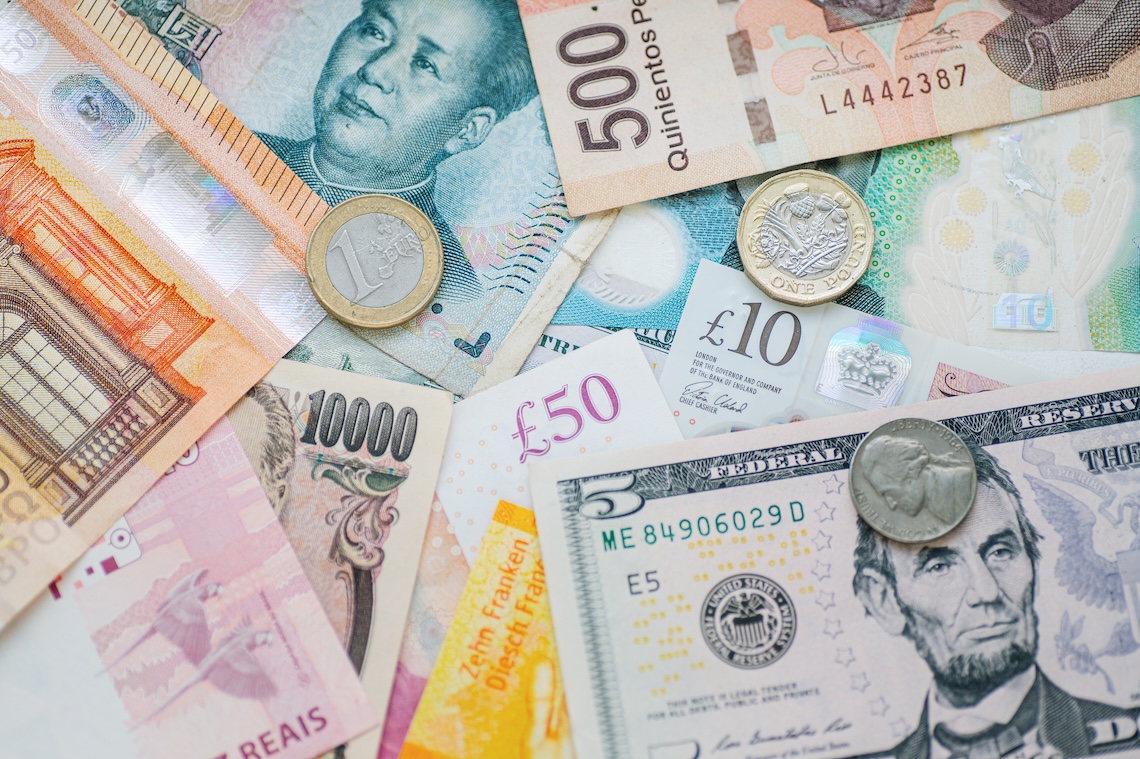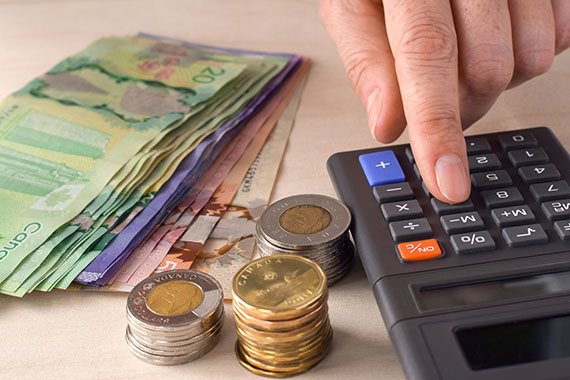A Guide to Foreign Currency
Introduction

What do we need to know when traveling to a new country or purchasing items from around the world?
What is an exchange rate and why does it matter?
Before we can answer these questions, let’s start by considering the meaning of the word currency.

Currency is money that is used to buy and sell goods or services. Every country has its own official currency. Prices of goods and services are determined based on each country’s currency.
In Canada, the official currency is the Canadian dollar (CAD).
Currencies around the world
Let’s take a closer look at what different currencies look like and what they’re called across the globe.
So, if we use Canadian dollars in Canada, why might it be important to know about currency around the world?
Recording information
When we explore new information, we can take notes to help us remember different facts and ideas.

- We can take notes to help us record new information.
- We can use words, drawings, or short sentences when we take notes.
- We should try and use our own words while taking notes.
- We can record questions in our notes.
Exchange rates
If someone is planning to travel and buy goods or services in a different country, or purchase items online from international stores, they need to understand what kind of currency is used, as well as the exchange rate. Exchange rates are constantly changing and are reported daily online and in the media.
Definition
Exchange rate
An exchange rate is the value of one country's currency in terms of another country’s currency. For example, if the exchange rate of Canadian dollars to US dollars is 0.74, it means that 100 Canadian dollars could be exchanged for 74 US dollars, or 74 US dollars could be exchanged for 100 Canadian dollars.
Cash can be exchanged at a local financial institution or currency exchange business before traveling. Currency exchange businesses are sometimes located in shopping malls and at airports. It’s always important to compare exchange rates, as these might differ slightly from place to place.
A person might also choose to use their debit or credit card to make purchases online or while traveling.
Now, let’s examine some exchange rates to see how different currencies compare around the world. The following table shows various currencies and their exchange rate to Canadian dollars. Notice that each currency has a three-letter code assigned to it.
Note: These are sample rates. Exchange rates change daily.
| Country | Currency name and code | Exchange rate |
|---|---|---|
| Europe | euro (EUR) | 0.63 |
| Brazil | Brazilian real (BRL) | 3.98 |
| Japan | Japanese yen (JPY) | 106 |
| Poland | Polish zloty (PLN) | 2.66 |
| Malaysia | Malaysian ringgit (MYR) | 3.11 |
| India | Indian rupee (INR) | 63 |
| United States of America | US dollar (USD) | 0.74 |
| Republic of Korea | Korean won (KRW) | 1003 |
How to convert currency
Desired currency = amount of your home currency x exchange rate
Try it!
Let’s try the following currency conversions for $100 CAD.

Teacher Chelsea says: Each type of currency has its own currency symbol. What do you notice about the currency symbols for the US dollar, Korean won, and Indian rupee?
- United States dollar: The exchange rate of the United States dollar to the Canadian dollar is 0.74. How many US dollars can you buy with $100 CAD?
1 CAD = 0.74 USD
100 x 0.74 = 74
$100 CAD can be exchanged for $74 USD
- Korean won: The exchange rate of the Korean won to the Canadian dollar is 1003. How many Korean won can you buy with $100 CAD?
1 CAD = 1003 KRW
100 x 1003 = 100, 376
$100 CAD can be exchanged for ₩ 100,376 KRW.
- Indian rupee: The exchange rate of the Indian rupee to the Canadian dollar is 63. How many Indian rupees can you buy with $100 CAD?
1 CAD = 63 INR
100 x 63 = 6300
$100 CAD can be exchanged for ₹6300 INR.
There are many digital tools that we can use to convert currency using the most up-to-date exchange rate. However, a simple online search may not always provide accurate information, as the rates shown might not reflect those used in the stock exchange. For reliable currency exchange rates, use the Bank of Canada’s online currency converter.
Online shopping considerations
When buying items online, it’s important to know whether you’re buying from a Canadian site or an international retailer. Each comes with its own set of factors to consider.
Tax, duty, and other charges

When shopping in Canada, we generally pay taxes on items purchased. If someone is shopping on a Canadian website, they need to be aware of taxes, as well as any delivery fees, when calculating their total purchase price.
Some people may choose to do their online shopping from international stores. There are several important things to consider when shopping outside of Canada.
Press the following tabs to find out more.
Definition
Duty
Duty is a fee that the government charges on goods brought in from other countries. The fee that is collected depends on the type of item, the item’s worth, and where it came from.
Handling fees
Handling fees include any costs the seller needs to cover to ensure that item is packaged properly and shipped safely. These fees do not typically cover the cost of shipping, but rather the packaging and administration costs.
Pause and reflect
What are the advantages and disadvantages of making a payment in a different country?
Why is it important to know an exchange rate before making a purchase?
Why might it be important to consider exchange rates when creating a travel budget?
Self check
For each type of currency, select the corresponding currency code.
Apply your knowledge
Press the following tabs to explore two different scenarios involving foreign currency.
Select one of the following scenarios and answer the questions. Record your answers and share with a partner, if possible.

Savinder loves soccer. He wants to purchase a soccer jersey from his favourite international soccer team. The jersey is available to purchase online, but it is through a European company that operates in euros. It costs €57.
What steps does Savinder need to take to find out how much the jersey costs in Canadian dollars?

Teacher Chelsea is checking her credit card statement, and she notices a charge of $150 that she does not recognize. When she does a bit of searching, she realizes that this amount is from a recent trip she took to Seoul, South Korea where she had bought some souvenirs.
The total for the items was ₩100,000. When she converts the currency using the current exchange of 1003 (1 CAD = 1003 KRW) it converts to approximately $129.
Should Teacher Chelsea report the difference to her credit card company, or could there be additional fees attached that explain the remaining balance? If so, what kind of fees could be charged?
Reflection
Consider what you’ve learned about foreign currency. Take a few minutes to record two or three of your main takeaways. How could this knowledge help you if you travel or buy things from other countries?
Critical thinking and problem solving
You will detect patterns, make connections, and transfer or apply what they have learned in a given situation to other situations, including real-world situations.
Communication
You will ask effective questions to acquire knowledge; listen to all points of view and ensure that those views are heard; voice their own opinions; and advocate for ideas.
Global citizenship and sustainability
You will understand the political, environmental, economic, and social forces at play in the world today, how they interconnect, and how they affect individuals, communities, and countries.
Mathematics - Grade 7
F. Financial Literacy
F1.1 identify and compare exchange rates, and convert foreign currencies to Canadian dollars and vice versa
Mathematics - Grade 8
F. Financial Literacy
F1.1 describe some advantages and disadvantages of various methods of payment that can be used when dealing with multiple currencies and exchange rates